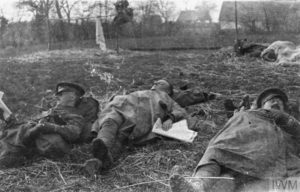Sunday August 4th, 1918
Reveille 6:30. Tents struck and boards cleaned. Had a quick walk right in village. Parcel from home. Fine parcel. Wrote home. Slept out on a stretcher – fine.
Special Reserve
Frank is enjoying the summer weather and has been sleeping outside. Tonight he has the luxury of a stretcher to sleep on. He liked it ‘fine’.
Yesterday the BWD reported that Temporary Lieutenant VHP de Jongh, a member of the Special Reserve, has been commissioned as a Second Lieutenant in the Regular Army. His appointment is back-dated to January 1917.
At the outbreak of war, the British Army was relatively small. It comprised 250,000 soldiers, 250,000 territorials and 200,000 reservists.² Many reservists were former soldiers. Others were in the Special Reserve, which comprised part-time soldiers and was similar to the Territorials. All these groups were represented in the British Expeditionary Force in August 1914.
Officers of the ‘New Armies’, serving for the duration of the war, were designated ‘Temporary‘. Also officers in the Regular Army could be given either a temporary or a substantive rank – only the latter was permanent.
Therefore, the permanent rank of VHP de Jongh is Second Lieutenant and his current temporary rank is Lieutenant.
Regular Army
General Jack assumed command of the 1/Cameronians two weeks ago. At an introductory meeting he was told by Brigadier General Mayne, of the 19th Infantry Brigade, that his Battalion is below form.
A few days ago, Jack wrote, ‘Although my battalion is labelled ‘Regular’ it contains no greater number of trained personnel than Territorial or New Army battalions. Perhaps we have one or two more experienced warrant and non-commissioned officers than they.’ ³

After four years of gruelling and hard-fought war, it is easy to assume that any distinctions of capability or experience amongst the Regular, Territorial and New Armies are long gone. Jack doesn’t share this view and is working hard to repair the ‘damage’:
‘The thorough and prompt attention to orders, formerly the rule in the Regiment, is now notably absent. Pressure is required to get work properly performed. This is not due to unwillingness, but to the present officers (save those from the Royal Military College) not having been well grounded at Home in their duties.’
‘Beside the daily round of inspections, we are making every effort to increase battle efficiency – slack soldiers are anathema. At dusk, therefore, as many officers and non-commissioned officers as feasible are collected for instruction which should have been given at Home.’³
Today a new programme for training and work is issued for the officers, NCO and men of 13/Manchesters. Perhaps Lt-Col Morrell shares Jack’s concerns.
13th (Service) Battalion War Diary – 4th August 1918 – Haudricourt
Special Brigade Commemoration Service. Programme of Training and Work (App No 1) issued period covered 5-11 August 1918. 1 OR having rejoined is taken on from 3-8-18. Capt WR Batty MC leave to UK.
References & Further Reading
¹ British Army Reserves etc. from the Long Long Trail
² The Commonwealth and WWI, from National Army Museum
³ ‘General Jack’s Diary, War on the Western Front 1914-1918’ edited by John Terraine, Cassell, 2003 (first published 1964),July 23rd 1918, page 247
* Q 60539, copyright Imperial War Museums



One thought on “Special Reserve – August 4th, 1918”
Comments are closed.